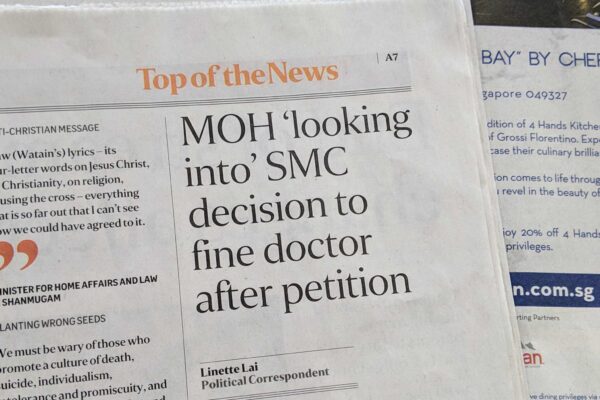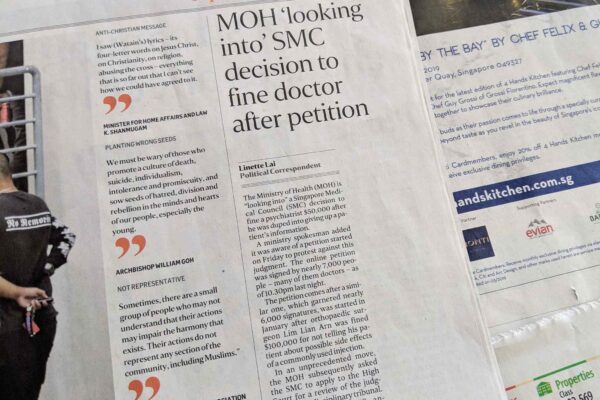
I am alarmed at some of the reactions concerning the fine imposed by the Singapore Medical Council on a psychiatrist. Some of the views that, because of good faith and good intentions, the wrong is excusable is, I think, just plain wrong.
The case at hand concerns Dr Soo Shuenn Chiang, a psychiatrist at the National University Hospital, who gave confidential medical information of a patient to a caller, without verifying the latter’s identity. The caller claimed to be the patient’s husband, but turned out to be the former’s brother. The brother then used the information for a purpose different from what he conveyed in the call.
I empathise with Dr Soo. He acted in good faith and with good intentions. The penalty imposed by the Singapore Medical Council (SMC) seems to be harsh. However, I truly can’t say if the fine, or the quantum of that fine, is appropriate. The Ministry of Health is concerned about SMC’s decision, so we can leave it to an appropriate platform to review that matter.
However, we must be careful not to dismiss the offence simply because there were some good reasons.

A key issue in SMC’s charge is that of non-verification of the caller’s identity. In this case, the caller was the brother, rather than the husband, of the patient. I don’t know if the case should have been treated differently because the caller was the brother, and if the psychiatrist would or should have acted differently had he known the caller’s true identity.
The point is that he failed to verify the caller’s identity. The caller could have been anyone. That’s right, the caller could have been absolutely anyone. Perhaps the employer, a neighbour, or someone with a grudge against the patient.
So let’s look at the situation again. Unknown person calls up the doctor, gives a story, and doctor then divulges confidential medical information. Wasn’t he somewhat irresponsible in the manner he handled confidential medical information?
Any defence based on good faith and good intentions must also take into consideration that the doctor made no due diligence effort to justify his actions. Surely we cannot condone such actions on the simple basis that they were in good faith and with good intentions.
This case concerns the handling of confidential medical information. We certainly should expect greater care and responsibility than in the handling of non-medical personal information, for which there is already a law that calls for penalties which include a fine and jail term. What message are we sending if we are to say that Dr Soo’s oversight is justifiable?
Most people will be able to make up an excuse, or even provide a genuine reason, for committing an offence. Does that make the offence pardonable? Yes, perhaps, there can be circumstances where the law, or the appropriate authority, can consider extenuating factors. I don’t think an oversight because you had a very busy day would be something that counts for much.
In this case of the SMC’s finding against Dr Soo, the disciplinary tribunal had in fact taken into consideration that the latter acted in good faith, and he had good intentions. It is not as if the SMC did not know or did not care for those reasons.
Dr Soo made a mistake. Whether the penalty the SMC imposed is appropriate or not, of course, is another matter altogether. An ongoing petition is asking for the decision to be reviewed. It has already succeeded in getting the Ministry of Health’s attention to act.
Let’s hope the outcome will be fair to all parties. This must also be timely reminder to all healthcare professionals, not just doctors, that with having privileged access to confidential information, they have a duty to handle those information with utmost care. It is not a responsibility to be taken lightly.
View Comment Policy